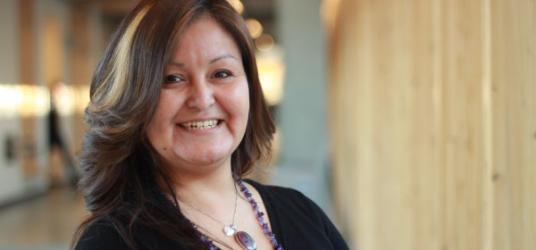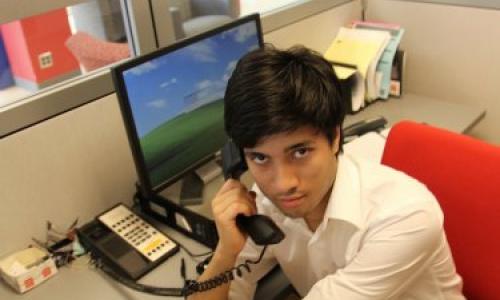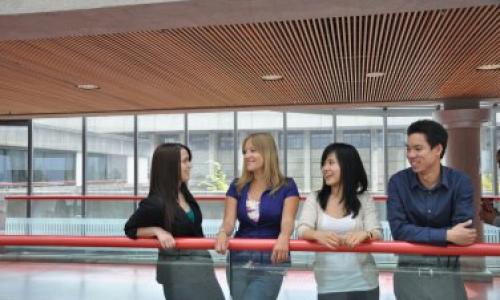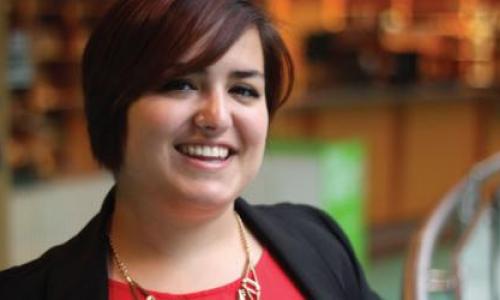
Name: Trina Setah
Nation or affiliation: Xeni Gwet’in of the Tsilhqot’in Nation
Where did you grow up?
Xeni Gwet’in First Nations (aka – Nemiah Valley)
What were some of the challenges you faced growing up?
I grew up in a very small community with my cousins for the first 14 years of my life. Naghtanaqed Elementary went to Gr. 9, after that students had to live in Williams Lake (which is 3.5 hours away from Xeni) and board with another family to finish Gr. 10 – 12. As a result of growing up in a small community, I was very shy and it affected my self-confidence and ability to participate in classroom discussions especially when I got to high school at Peigan First Nation and then Williams Lake. I had to overcome my shyness as I worked my way through high school and into my careers.
When I turned 15, I got to go live at the Peigan First Nation, Alberta with my aunty Eila Quilt. She was quite a role model for us young ones, because she got her degree to become a teacher from University of British Columbia (UBC). Her first job was as a teacher at the Peigan Elementary. During my stay with her, I learned to improve my studying habits and was able to benefit from it by getting good grades. It was a very positive experience, as I also met a lot of the locals and made a lot of friends from the Peigan First Nation of the Blackfoot Nation. I would like to think that we were each others inspiration, as a lot of the people we went to school with had also gone to further their education and got their degree’s as well and are in successful careers.
I returned to Williams Lake to finish my Gr. 10 - 12, which meant being away from my parents during the school year, with the opportunity to travel home on weekends. I missed my parents during the week, and would travel home happy. During my weekends I would spend time with my parents horseback riding, and got to see so much of the land. A lot of us from Xeni would make this trek together, from town to our home on weekends.
When you were young, what did you want to be when you grew up?
My goal was to become a Registered Professional Forester (RPF)
When did you start thinking about attending post-secondary?
I really loved being outdoors, in nature and figured that as an RPF that it would be my best bet to be closest to what I loved the most. Especially seeing how happy my father had been in his job at the Alexis Creek Forest District, he would come home with great stories that inspired me to think about a career in Forestry. I then began to tailor my courses in school to learn as much as possible on the Natural Resource and Forestry aspect, and even took courses at Thompson Rivers University (TRU) in Williams Lake after graduating from high school. I took a Business Administration Certificate program, and a Forestry program at TRU. After a couple of years of the Post Secondary scene, I realized I needed to try working and putting some of the skills that I gained to use.
As the years rolled on, I was lucky to work my way up the ladder in careers experiencing working with a youth employment program, education, treaty, fisheries and natural resources from a community level, Tribal Council level, then a Provincial Level. I am always thankful and fortunate to have worked with the Xat’sull First Nation, Northern Shuswap Tribal Council, Tsilhqot’in National Government, First Nations Fisheries Council and now Simon Fraser University (SFU). I also realized while gaining such great work experience that I needed to return to school and get my degree. I am now enrolled as a student at SFU, and looking forward to the opportunities.
It was tough being a young mother, raising young ones and going to school. I had tried when I was quite young, and decided to dedicate my time to my career for my sons who were enrolled to hockey, which requires a lot of time and money. It was a sacrifice well worth it, as I spent many a weekend cheering them on in their games. Now that they are all fairly grown up, and not enrolled in hockey I have decided to look at what is best for me. I have moved to Vancouver to explore my options in both school and career. All of my years of hard work paid off, as I was lucky to find a position as an Aboriginal Co-op Coordinator at Simon Fraser University (SFU). I am currently in this role part-time and will be a full-time student moving forward in the Fall Semester 2015 as an Undergraduate in the Faculty of Environment for the Archaeology Program.
My one social studies teacher would tell his class,
“Today’s nerds are tomorrow’s Ferrari owners”.
There is no shame in being a nerd.
What were some of the reasons you decided to further your education?
One day I will have this degree under my belt, and my goal in life has always been to climb the rungs on the ladder. I don’t know what will be waiting for me in five years but I look forward to the journey and I am prepared for it. My family has been very supportive of my journey.
The reality of this era is that a person will need more than work experience to get the high paying job or management roles in any organization.
Share a brief timeline of your schooling experience.
Add it all up and I have met wonderful people along the way whether in my school or careers (because they are both the same – “learning by doing” a philosophy that benefits the SFU Co-operative Education Program), and each of their perspectives has influenced my choices in school and my careers. I am forever thankful for all of those interactions, mentorship and networking.
Share your experience of finding funding?
In one of my first jobs when working with Xat’sull First Nation, my boss taught me to use a reporting format using an outline with the objectives, pictures and provide a description of activities and how funds were spent. This was a format that I carried into other positions as I used it to request for funds from the departments to host community events, and would always provide a report as a thank you and follow up for their support. They never questioned my amount, as the report would be sufficient for them to report on their departments support at year-end.
It really depended on the organization that I was working with, and what type of events we were hosting. Sometimes the funds were already available, it was a matter of spending it and coordinating tracking of how the funds were spent. Other times it meant finding the funds, others typically did proposal writing for projects. Project Coordination was one of the most experiential career related ones that I can reflect on even if it was a process that came with a huge learning curve. Having the right filing processes, reporting processes, tools for tracking the funds and having a great team makes project coordination fun.
Share a time when you wanted to quit.
There was many times in my career that I wanted to quit because of difficult situations or people, but determination kept me on track. I had to learn how to move past those difficult times, leaned on family and friends and also took their advice while I kept on my journey. It is not easy, but the one thing that I can always appreciate in my teachings from my parents and family is that – “we didn’t raise you to be a quitter, find a solution.”
There was always a lot of teamwork support in my career journeys, that quitting was far from my mind. I got to work with some very intelligent people who taught me a lot along the way, which has benefitted me exponentially in terms of administration, project coordination and communication styles.
I also was a young mother who had to provide for her children, so quitting was not an option. I also earned respect along the way from my peers because of my determination and confidence. I had to show no fear while making mistakes (at least once), ask a lot of questions, and observe. When dealing with the difficult situations or people, I always dealt with those moments as positively as possible, because at the end of the day that person's issues are their own. I come to work to do what I need to do, and do not take on any more than I can handle.
Share your proudest moment.
In all of my years, I worked to be well known, respected and network with many people. Those networks proved to be worth-while as I worked my way up the ladder. It pays to make good connections that have strategically helped me out when I needed them. Especially when I left one career for another, I wanted to leave on a positive note and have that door open for when I return, should I return.
All of these years of hard work have paid off because at times I would sit there and wonder if what I was doing was worth it?
It most definitely was, because of all of that work experience I am happy that I am working at Simon Fraser University as an Aboriginal Co-op Coordinator. To be able to bring all of the tools and tips that I learned along the way and share that knowledge with any student that wants more information.
Where are you currently in respect to your education?
I am now returning to complete my Undergrad under the Faculty of Environment under the Archaeology Program at SFU, and have just started that journey.
What did you do after you graduated your first degree?
Celebrate when I get there, as it is on my to-do list.
What has been your most important lesson returning to school?
To have worked my way up the ladder in any organization wasn't always easy because I was going against the grain, some advice for others; yes your education is important.
What advice do you have to offer other Indigenous students?
Education is so important, and so is having work experience. You need to find a balance for both, but make your work experience strategic placements so that they look good on your resume along with your degree. Networking in your career is so important while getting your degree.
What are your goals for the future?
To continue making a positive impact on people’s lives in any job that I take on.
—
Sechanalyagh - thank you,
Trina Setah
* Trina Setah has moved on from this position and has resumed her full time studies at SFU. If you are a student interested in co-op, please contact your program's Co-op Coordinator.















